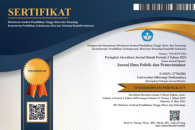Focus and Scope
Journals "Ilmu Politik dan Pemerintahan" aims to disseminate the conceptual thoughts or ideas and research outcomes that have been accomplished in the area of Political and Government Science focusing on the primary issue as follows:
1. Local Politics and Regional Autonomy;
2. Gender and Identity Politics;
3. Election and Party systems;
4. Civil Society;
5. Political Communication;
6. Media, Democracy, and Human Rights;
7. Indigenous Peoples Study;
8. Strategic Studies;
9. Democracy and Human Rights;
10. Security Politics;
11. Public Policy;
12. Politics and Islamic Boarding Schools;
13. Environmental Politics;
14. Political Comparison;
15. E-Governance;
16. Global Politics
Section Policies
Articles
Editorial Information
Peer Review Process
This journal uses a double-blind review, which means that both the reviewer and author identities are concealed from the reviewers, and vice versa, throughout the review process. To facilitate this, authors need to ensure that their manuscripts are prepared in a way that does not give away their identity. Every submitted article is independently reviewed by at least two peer-reviewer. The decision for publication, revision, or rejection is based upon their reports/recommendations. After being reviewed, there will be four kinds of editor decisions based on reviewers’ recommendations:
Accept Submission: The submission will be accepted without revisions.
Revisions Required: The submission will be accepted after minor changes have been made.
Resubmit for Review: The submission needs to be re-worked, but with significant changes, may be accepted. It will require a second round of review, however.
Decline Submission: The submission will not be published in the journal.
Open Access Policy
This journal provides immediate open access to its content on the principle that making research freely available to the public supports a greater global exchange of knowledge.
Archiving
This journal utilizes the LOCKSS system to create a distributed archiving system among participating libraries and permits those libraries to create permanent archives of the journal for purposes of preservation and restoration. More...











